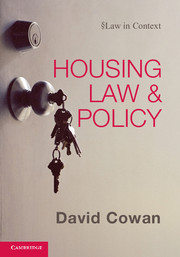Book contents
- Frontmatter
- Contents
- Preface
- List of abbreviations
- Table of legislation
- Table of international instruments
- Table of cases
- 1 Locating housing law and policy
- Part I Regulation of housing tenure
- Part II Access to housing
- 6 Homelessness
- 7 Allocating social housing
- 8 Eligibility
- 9 Access to the private rented sector
- 10 Access to owner-occupation
- Part III Rights and responsibilities
- Postscript
- Bibliography
- Index
9 - Access to the private rented sector
from Part II - Access to housing
Published online by Cambridge University Press: 05 June 2012
- Frontmatter
- Contents
- Preface
- List of abbreviations
- Table of legislation
- Table of international instruments
- Table of cases
- 1 Locating housing law and policy
- Part I Regulation of housing tenure
- Part II Access to housing
- 6 Homelessness
- 7 Allocating social housing
- 8 Eligibility
- 9 Access to the private rented sector
- 10 Access to owner-occupation
- Part III Rights and responsibilities
- Postscript
- Bibliography
- Index
Summary
Previous chapters in this part have considered the rules about access to social housing through homelessness legislation and the general law on allocating social housing. They noted that accessing PRS accommodation may be one outcome of any such application. In this chapter, consideration is given to three broader issues about access to the PRS: the terms of the agreement; tenancy deposits; and state support for rent payments (HB). These issues do not necessarily arise when a landlord and tenant actually enter into an agreement – most often, other than possibly HB, neither party gives much thought to them at that point. Issues about HB can arise at the outset or during the currency of the agreement (if, for example, the tenant loses their employment). However, the point of entry into the agreement is the crucial moment to which the law looks when problems in the relationship subsequently arise. Access to HB may determine whether a tenant can afford the rent ‘negotiated’ at the outset. Payment of a tenancy deposit upfront, before the tenancy commences, can cause problems for either party at the point at which the tenancy is determined. The final issue considered in this chapter relates to tenure shifts – where an owner sells their property and then rents it straight back. These arrangements cause particular problems, which are discussed in this section (and to which we return in Chapter 16 below).
Contractual terms
It is usual today for tenants to be given a written contractual agreement by their landlord. Although short-term tenancies of less than 3 years can be granted orally as a matter of strict property law (s. 54(2), Law of Property Act 1925; s 2(5), Law of Property (Miscellaneous Provisions) Act 1989), it is usually the case that they are granted in writing because, amongst other reasons, that facilitates any subsequent claim of the landlord to possession. The common law assumes that the terms of the agreement are freely negotiated, like any other contract. However, certain terms are implied into residential tenancies, or superimposed on the contract, as a matter of common law and statute – amongst others, these give the tenant certain rights, for example to quiet enjoyment and security of tenure as well as placing obligations on the landlord, subject to certain criteria, to conduct certain repairs to the property. These extra-contractual rights are considered in more depth in Chapters 11 and 13 below.
- Type
- Chapter
- Information
- Housing Law and Policy , pp. 221 - 243Publisher: Cambridge University PressPrint publication year: 2011



